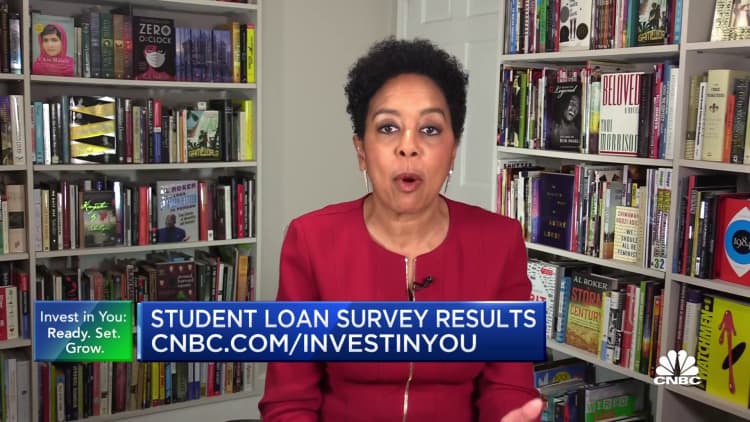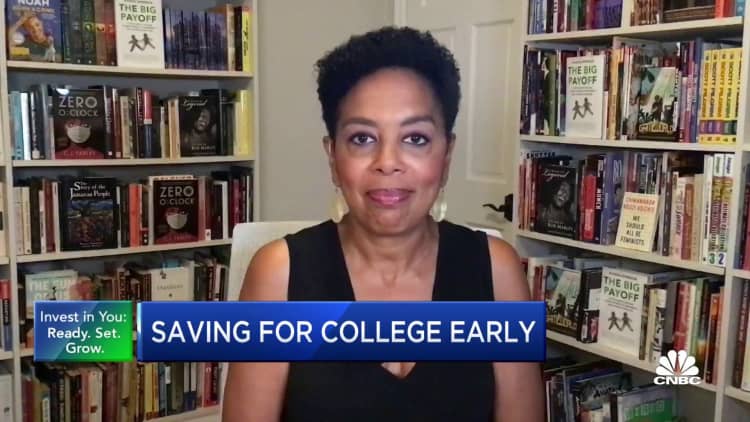A college education was supposed to help close the wealth gap for Black Americans.
Yet, researchers are finding the opposite is true, thanks to student loan debt.
Black families' median wealth is less than 15% of that of white families, according to the Federal Reserve's 2019 Survey of Consumer Finances. Among student loan borrowers, that gap is even more pronounced, research has found.
Black borrowers' wealth represents roughly 5% of white borrowers' wealth, according to a paper by Raphael Charron-Chenier, Louise Seamster, Thomas M. Shapiro and Laura Sullivan titled, "A Pathway to Racial Equity: Student Debt Cancellation Policy Designs."
More from Invest in You:
Why racial justice groups want Congress to reinstate child tax credit
What to do with a 529 college savings plan if student debt is forgiven
Here's how to get the most money towards college
"Because education is debt-financed, our education is not having the same effect," said Seamster, an assistant professor of sociology and criminology and African American studies at University of Iowa.
"It is not leading to wealth for Black families and, in fact, it is actually exacerbating wealth inequality."
'Student debt is truly a debt trap for Black borrowers.'
Higher education is getting increasingly more expensive. Because Black households tend to have less wealth, a greater number have to borrow money to get a degree — and the amounts they are borrowing are larger than those of their white counterparts, explained Charron-Chenier, a sociologist and assistant professor at Arizona State University.
About 24% of Black adults say they have federal student loan debt, compared with 14% of white adults, according to a CNBC + Acorn's Invest in You Student Loan Survey conducted by Momentive.

Black college graduates owe an average $7,400 more than their white peers the moment they graduate, a report from Brookings Institution found. Four years after graduation, they owe an average $52,726, compared with $28,006 for the average white college graduate, according to the report, which included nonborrowers in the average.
Meanwhile, some 66% of Black borrowers owe more than they originally borrowed 12 years after starting college, another analysis found.
"That's because interest accumulates on their loans that is greater than the payments that they're able to afford on their loans," explained Charlie Eaton, an assistant professor of sociology at the University of California, Merced who took part in the analysis.
"So, student debt is truly a debt trap for Black borrowers."
Impact of student loan forgiveness on the wealth gap
Forgiving student debt can have an impact on the racial wealth gap, although it is not the only solution to a complex problem, advocates contend. Instead, it's a first step toward addressing it, they said.
Canceling $50,000 in student debt for households with income below $100,000 would increase black borrowers' wealth to 33% of white borrowers' wealth, up from 5%, according to "A Pathway to Racial Equity." Bumping it to $75,000 in forgiveness would raise it to 42%, the report found.
"While the amount itself is not going to have a huge immediate impact on the racial wealth gap, it can help people at a really crucial time," Charron-Chenier said.
It's during that post-college time that young adults get jobs and perhaps buy a home. Yet student debt holds many people back from homeownership.
Student debt is truly a debt trap for black borrowers.Charlie EatonAssistant professor at University of California, Merced
"The racial wealth gap is not exclusively, but very strongly, driven by people's ability to just purchase a home and keep its value," Charron-Chenier pointed out.
To be sure, student loan forgiveness is not the remedy for the intergenerational wealth gap, said Nicole Smith, research professor and chief economist at the Georgetown University Center on Education and the Workforce.
"The real intergenerational racial wealth gap that we observe in American society took generations to create, and it absolutely will take generations to remove, as well," she said.
"Even if we were to magically erase that burden from every single person of color, they are still going to be leaps and bounds behind the rest of society because it's just such an egregious difference that's been compounded by structural inequality, by racial inequality, by racial injustice, for decades."
How much debt should be forgiven?
President Joe Biden has supported wiping out $10,000 from borrower's accounts. However, no decision on the matter is expected until later this summer, The Wall Street Journal has reported.
For the NAACP, $10,000 isn't enough.
"It's throwing a bucket of ice on a forest fire," NAACP President and CEO Derrick Johnson recently told CNBC. "Cancellation must be a minimum of $50,000."
Some Democrats, including Sen. Chuck Schumer of New York and Sen. Elizabeth Warren of Massachusetts, are also pushing for at least $50,000 in forgiveness.
Opponents of student loan forgiveness argue that wiping away the debt would add up to $1.7 trillion to the national debt, further fueling inflation. Several Republican senators introduced legislation in May to prohibit the Biden administration from canceling student loan debt.
"This decision would not only be unfair to those who already repaid their loans or decided to pursue alternative education paths, but it would be wildly inflationary at a time of already historic inflation," Sen. Mitt Romney, R-Utah, said in a statement.

Opponents also maintain forgiveness would worsen inequality, pointing to a separate Brookings Institution report that shows one-third of all student debt is owed by the wealthiest 20% and only 8% is owed by the bottom 20%.
The best way to address racial and socioeconomic wealth gaps include grants and loans to higher-education institutions, income-based repayment plans and targeted relief to borrowers, Brookings Institution's Adam Looney wrote.
While some advocates argue that blanket relief is best, Georgetown University's Smith agrees that there should be some parameters, perhaps around income and occupation.
"It has to be measured and it has to be decisive," she said.
Once the issue of student loan debt is addressed, it will allow the focus to then turn toward free and affordable college — so that the cycle does not continue, the University of California's Eaton said.
"Canceling student debt will put Congress on notice that now is the time to create debt-free college programs so that students, including Black students, don't have to borrow for college," he said.
SIGN UP: Money 101 is an eight-week learning course to financial freedom, delivered weekly to your inbox. For the Spanish version Dinero 101, click here.
Disclosure: NBCUniversal and Comcast Ventures are investors in Acorns.






